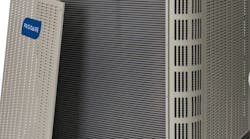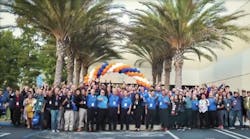With more than 50 years of experience in designing and manufacturing custom roof curbs for HVAC systems, Thybar Corp. knows that every order that comes into one of its five facilities around the United States requires a unique solution, and its staff has the experience and credentials to create the right product for each project. With its headquarters in Addison, IL, Thybar’s customers include national retailers and manufacturers who rely on HVAC systems to run 24/7, in many cases. If their HVAC system can’t function, neither can they.
That puts a lot of pressure on Thybar, but Tim Warner, president of Thybar, says that the company prepares for each and every job. He cites its extensive library that maintains model numbers, sizes and specifications of past and current HVAC systems, a professional engineer on staff who is licensed in all 50 states, and five facilities across the U.S. each with its own drafting/design staff. Thybar’s library is especially important because it also includes discontinued rooftop unit information, which allows for accurate matches of the dimension of the new rooftop unit with the existing curb, without requiring extensive field measurements.
Thybar has amassed such a wealth of information and experienced staff because it has been in the HVAC business since 1959. Thybar was formed by two HVACR contractors, Thygerson and Barmantje, who wanted to get out of the field and into the factory to design and manufacture a niche product for the industry. That led to their first product, Thycurb, pre-fabricated roof curbs. Today, Thybar manufactures a number of different products that they design to accommodate all types of HVAC systems and weather conditions. Thybar is also employee-owned, operating an Employee Stock Ownership Plan that originated in 1993.
One of Thybar’s most popular products is the ThyCurb Retro-Mate, a custom-fabricated roof curb designed to adapt existing curbs to fit new rooftop equipment; it can accommodate virtually any upgrade options and alternatives for a customer. With Retro-Mate, the ductwork for an existing unit can be left in place with all of the transition work done with the Retro-Mate curb. Retro-Mate is constructed of heavy gauge galvanized steel and is factory insulated. It also maintains the roofing integrity and eliminates support steel reconstruction. Its prefabrication reduces labor time to hours rather than days.
ThyBar’s library is also a tremendous asset for Retro-Mate projects. “With our library, there are very few surprises,” Warner says. This is especially important in the replacement market because building owners and managers often wait to replace their HVAC system until it’s too late. Then, they’re scrambling to get a new unit into place as quickly as possible. “Our retrofit program gets right into this issue,” Warner says. “Our Retro-Mate product is adapted to do these turnarounds quickly and keep their business going. Everything is based on turnaround time.”
Thybar similarly designs its other products to reduce the time and expense for building owners and managers. For example, the Vibro-Curb III incorporates adjustable spring isolators and a roof curb into a single unit, which allows the rooftop unit to be mounted immediately after the curb is installed and the roofing can be completed later without distributing the unit.
Thybar specializes in roof curbs for seismic/wind restraints based on the building code that governs the particular jurisdiction, calculating the seismic/wind load design force that the rooftop equipment and roof curb are required to withstand and then determining the requirement for the attachment of the rooftop equipment to the roof curb and the roof curb to the building structure.
Thybar’s roof curbs have received seismic qualification performance requirements under the 2006 International Building Code test protocol. To qualify for this designation, Thybar submitted its roof curbs to the University of Buffalo’s Structural Engineering and Earthquake Simulation Laboratory for a series of seismic qualification tests. Scientists mounted four rooftop units to Thybar roof curbs, which were then mounted to a shake table (you can see the video at http://www.thybar.com/seismic.html).
Thybar is the only manufacturer to have received a Notice of Acceptance (NOA) by the Miami-Dade County Building and Neighborhood Compliance Department for its roof curbs. Bill Evitt, Thybar’s CEO, says the NOA from Miama-Dade County is significant because it demonstrates that Thybar’s roof curbs meet the wind load standards that have been set in Miami-Dade County, which takes hurricane preparation and planning very seriously. “Not every building needs that NOA,” Evitt says, “but as we continue to have hurricanes up and down the East Coast and doing the damage they’ve been doing, these NOAs are going to become more important.”
Thybar was able to secure a NOA with Miami-Dade County because its salesperson who covers that region recognized the significance of such a designation and worked closely with government officials to make it happen. This example is indicative of the experience and expertise that Thybar’s sales staff brings to all facets of HVAC and building systems. “There’s a lot of value add, and our sales staff goes a step further than a lot of people,” Evitt says. “They work with the customer to make sure they get exactly what they want and we stand behind our work.”
“Our salesmen, when they’re out, call on wholesalers,” Warner says. Often, a Thybar salesperson will work with distributors at the branch level as well as with contacts at its corporate headquarters. The goal, Warner says, is to make sure that Thybar is working with wholesalers and their customer in ways that are most effective for them. “Each wholesaler attacks the market differently,” he says.
Because these roof curb systems can be large and weigh up to 150 pounds or more, Thybar’s products can be costly to ship. In fact, shipping a roof curb across the country could cost as much or even more than the product itself. To alleviate these shipping costs and get products to the buildings as quickly as possible, Thybar has five manufacturing facilities: at its headquarters in Addison as well as facilities in Texas, Nevada, Ohio and Kentucky. Adds Warner: “We’re not through expanding. If our markets expand, we’ll look for another facility so that we can cut down on freight and give our customers a very competitive product.”
Each Thybar facility has its own sales and drafting/design staff, and they strive to work closely with the HVACR wholesale distributors in their area. “We prefer to work with the wholesalers,” Warner says. “Wholesalers have a good working rapport with the contractors, and they can supply them with what they need quickly.”
Because Thybar does no work on the residential side, they seek out wholesalers who are strong in commercial sales or who are looking to expand into commercial. “We look for the wholesaler who is doing a lot of quick turnaround for the commercial business such as restaurants and malls.”
There are a lot of variables when it comes to roof curbs and working with new and existing systems that can make this product difficult to understand for wholesalers, Evitt acknowledges. But Thybar’s trained staff, including its registered PE, can work with them and their customers to select the right products and get the exact measurements quickly. Thybar designs most of their work at its facility, although they occasionally go to a job site and measure for verification purposes.
With Thybar’s facilities located in different parts of the country, its staff can focus on the particular climate variable for that region. “Our sales staff is in constant contact with customers and manufacturers,” Warner says. Whether they’re on the job site on the day that the unit is installed or on the phone with the customer during the fabrication of the products, nothing is left to chance.
Michael Maynard is a contributing editor based in Providence, RI. He writes frequently on HVACR, construction and architecture issues. Contact him at [email protected].
Best Practice
Thybar Corporation designs and constructs seismic/wind load-rated roof curbs. Rated curbs will resist the effects of site-specific forces determined according to the requirements of the International Building Code or other applicable codes.
Curb walls are of heavy gage galvanized steel construction, and appropriate wall thickness is determined by project-specific analysis of curb wall stresses generated by the seismic/wind load acting on the rooftop unit.
Seismic/wind load-rated curbs can be provided in insulated, non-insulated and vibration isolated styles of various heights for sloped or flat roofs. Wood nailers are provided for attachment of roofing material.
Project-specific seismic/wind calculations can be provided for the roof curb, the connection of rooftop equipment to roof curb, and roof curb con nections to the building structure. Calculations will be signed and sealed by a Professional Engineer (PE) registered in the state where the project is located. Our PE is licensed in all 50 states.
Thybar is the only curb manufacturer with NOAs (Notice of Acceptance) for their products. Since Miami-Dade allows NOA to apply to a narrow group of curb sizes for a particular unit, we DO NOT have a NOA for every curb. If we do not have a NOA for the curb/unit combination your customer is interested in, then we’ll do project-specific calculations. The calculation process uses a Questionnaire that is available through the sales staff or on our website.





